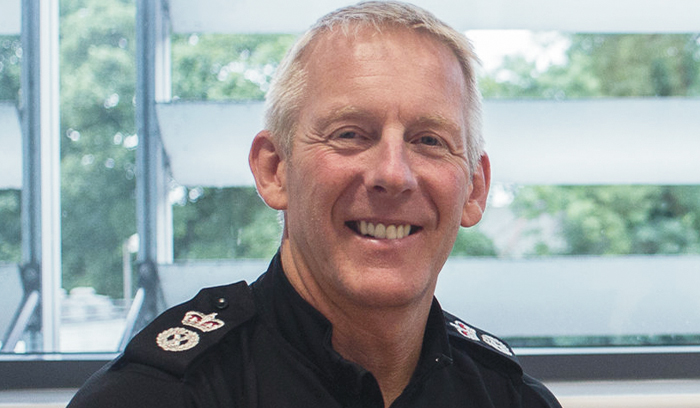Handling with care
With cancelled leave, longer hours and an environment that brings officers into contact with a potentially deadly disease during every shift, the Covid-19 pandemic has brought police wellbeing to the top of the agenda.
One day in the future, when the coronavirus pandemic is finally over and life has returned to something resembling normality, police chiefs around the country will come together, discuss the lessons learnt and draw up plans and contingencies in the event of a similar outbreak in the future.
However, for Chief Constable Andy Rhodes, the National Police Chiefs’ Council lead for organisational development and wellbeing, tackling the impact of the pandemic on officer wellbeing is something that needs happen without delay.
“Covid has really thrust wellbeing to the forefront of our thinking, even more than it was previously,” he said. “We’ve talked for years about the challenge of delivering wellbeing in an organisation where the work is very stressful and involves a lot of trauma, and about the importance of avoiding a one-size-fits-all mindset.
“What Covid has done is busted the myth that what happens outside of work doesn’t affect you and shouldn’t affect you when you’re back in the office.
“We’ve had a hidden problem in policing, hidden by the culture around mental health and we’re now finding that fatigue is very similarly hidden within the culture.
“A lot of the issues that we are now finding out about poor sleep are things that were just sort of accepted as being normal. But it’s not normal to be exposed to the frequency and the level of trauma that many of our staff are.
“However, what we have done over the past five or six years is to start to take the lid off of that in a very supportive and open way and say, that is part and parcel of being a professional police officer or a member of police staff. Therefore, we want you to speak about it if you don’t feel okay. We want to have the right services and culture and leadership around you so that you can maintain compassion for yourself, your family and most importantly the victims of crime we’re dealing with.”
Much of the current focus of the National Wellbeing Service is teaching resilience, but Mr Rhodes acknowledges the danger that this could lead to problems being pushed aside in the short term, only to emerge in a more damaging way at a later date.
“There is a negative form of resilience, which I have talked about before,” he said. “You zip your stab vest up, put your game face on and enter a different world. You go out with the attitude that nothing can hurt you. That is quite commonplace in a high trauma environment because it works, to some degree.
“But it doesn’t work long term, it’s not healthy for the organisation and it’s certainly not healthy for you, your family and victims of crime. You do not want to be turning up to somebody who is having that low moment in life with your game face on. They want to genuinely connect to you on an emotional level.”
All forces are now working towards a set of recently published occupational health standards which, alongside the future implementation of the police covenant, will ensure that the topic is front and centre for everyone working in the law enforcement field.

Mr Rhodes has long been passionate about occupational health standards and the National Wellbeing Service is supporting forces in terms of reviewing their structures around the issue, or the external provision they buy in, to help them meet the required standards.
However, Mr Rhodes is only too well aware as a result of developments in his own force that when you enable people to be comfortable enough to open up about the impact of the job, you need to be prepared for the tsunami of response that may follow.
“If you ask everyone to talk about mental health at work, then you’d better be prepared and have the right services available to them for when they start talking. We found here in Lancashire that our psychological referrals increased from 350 a year to 1,050 in the space of 18 months to two years. That’s in a workforce of 6,000,” he explained.
“This was basically unmet need coming forward. This isn’t people who have just decided they have got some bad experiences that all of a sudden they want to talk about – they have been not talking about them.
I’ve spoken to roads death investigation officers who have got 20 years’ service and have never spoken openly, until now, about how this affects them at an emotional level and affects their life outside of policing.
“And what you get, every now and then, is a straw that breaks the camel’s back. I’ve had people speak to me about this and say I thought I was fine but this one event that was quite innocuous, just had a massive impact on me and I never saw it coming.”
Referrals in Lancashire have since settled down at around 650 a year – around one in ten of the workforce – and Mr Rhodes ensures that the high-quality interventions are delivered in good time for all those that need them.
“You’ve got to get this right, otherwise people stick their hand up and they have to wait six months for a counselling session,” he said.
Between referrals, Lancashire Constabulary’s therapists will often join officers in parade rooms to break down barriers and build trust. They will explain that having a conversation will not end up with a mark on their record that somewhere down the line prevents them from joining CID or a firearms team. Along with absolute confidentiality, they emphasise the multiple benefits that can come from speaking out rather than holding everything in, which is what far too many officers have been doing for far too long.
Evidence from the National Wellbeing Service suggests such attitudes are changing – part of a wider change in society as a whole around attitudes towards mental health.
Mr Rhodes recalled a recent conversation with a detective inspector – a rank that tends to be exposed to high levels of trauma as they attend every scene while on shift – who spoke about the changes he had seen in the job. In the aftermath of a horrific job, he and some colleagues went out for a coffee and all discussed how sad they were and how the incident had affected them.
“He said that conversation would never have happened even ten years ago and he was right. But that conversation is all those people need to feel okay about the job, to know they are not alone,” said Mr Rhodes.
“They realise it’s okay to reach out to one of their colleagues because people trust their peers. That is a self-generated change in the workplace and it’s positive resilience, not negative.”
Although attitudes towards mental health have been changing within society as a whole, credit for a far healthier attitude towards dealing with the traumatic impact of policing must also be given to the work of Oscar Kilo, the brand name of the National Wellbeing Service.
Its post-incident trauma support model is widely acknowledged to be one of the best in the world and forces across the country have also received training in how to set up best practice peer support models to ensure help is always at hand for those officers who need it.
Those in higher risk roles also have the opportunity to take advantage of high-quality psychological monitoring – “check-ups from the neck-ups”, as Mr Rhodes describes them.
The cultural change is also being driven by a new generation of recruits who are the product of an educational system where mental health is a recognised issue. As a result, they come to the force with high expectations. If they are exposed to trauma during a shift, they expect to be spoken to before the end of the day and be offered support, not taken down the pub to get “blackout drunk”.
With many response officers having less than five years’ service, and this figure set to drop further still though the uplift, there is a growing proportion of the workforce who no longer feel there is any stigma attached to talking about their mental health and offloading about the stresses and strains of the job. In many such cases, the only factor holding them back from seeking help is a lack of time to access such services.
To cater for this cohort, Oscar Kilo created the Wellbeing Outreach Service – a fleet of bespoke fitted vans, which can deploy to operating bases across England and Wales, providing a platform to deliver physical, psychological and financial health checks on the spot.
The vans are supported by occupational health staff from the host force or the force’s external provider and the team may include financial advisers, Police Federation representatives, chaplaincy members, trade union representatives and other staff support networks.
More than 10,000 people have been through them, since they were introduced. A typical multi-week deployment will see the vans placed outside key locations and times to cover day, night and weekend shifts for maximum coverage.
Often found strategically parked directly on the path between the police station exit and area where response vehicles are parked, officers are easily tempted in with a cup of tea and a cake.
The randomised nature of the surface means those staffing the vans will often uncover the warnings signs of trouble to come further down the line with incidents of dangerously high blood pressure, revelations about crippling debt and even suicidal thoughts having all emerged during these impromptu sessions.
The wellbeing vans represent an opportunity for forces to make sure staff know what services are available should they ever need support, whether that be in relation to their mental or physical health, finances, advice about work/life balance, or anything else for that matter.
However, staff do not have to need support or advice to go along – the vans offer the opportunity for people just to pop in, spend a few minutes having a look around, take some information away in case they, or a member of their team, need that support in the future.
“I talk about trauma as something that is our job,” said Mr Rhodes. “We take pride in dealing with traumatic events and we should also take pride in developing ourselves personally and therefore contributing to this culture change so that we can deal with trauma really well and professional and with compassion.
“Trauma is going to happen. If you don’t want to be exposed to trauma, don’t join the cops. It’s an exception thing to be able to be exposed to these levels of trauma, stressful incidents and so on and be able to stay healthy.
“It is possible, it is more than possible because people have been doing it ad infinitum. The problem is that sometimes in the past when people started to struggle, we’ve walked away from them. We’ve dived into broom cupboards to get away from them, and we’ve seen them go under. That should not be happening in UK policing now.”
Mr Rhodes agrees that while the stigma around talking about mental health is definitely declining, this is not necessarily the case when it comes to talking about financial health. And this is an major issue just as likely to impact new recruits on low starting salaries as it is those longer in service, who are earning more but are more financially stretched as a result.
He reveals that studies have shown that, out of a total police workforce of 200,000, an astonishing 29,500 – 15 per cent – have less than £125 spare each month after paying for all their outgoings.
“Now bear in mind we’re heading into a recession and while you have good job security in the police, your other half might not have. Your kids might not have. The financial stress is absolutely massive,” said Mr Rhodes.
“There is a big stigma and people don’t want to declare it because it’s a disciplinary offence to not discharge a lawful debt. Even in relationships, even couples don’t talk about money enough.
“Pam Kelly [chief constable of Gwent Police] has asked me to refresh what we are doing about financial wellbeing and the first thing we need to do is register with chief constables to see if they know whether this is a problem in their workforce.”
Mr Rhodes recognises that the longer the lockdown extends and the more pressure there is placed on family finances, an already worrying problem is only going to get worse.
Last year it emerged that half of Hampshire Constabulary officers who took part in a poll said they had taken a pay cut to join the force and that their domestic financial situation has an impact on their ability to do their job.
The survey also showed that 88 per cent of respondents would not be able to cope financially with a change in circumstances, such as job loss, health issues, or divorce, and that 58 per cent have considered a career outside of the police to improve their finances.
Of those who responded to the survey, 68 per cent said they would consider using the Hampshire Police Welfare Fund.
Hampshire Police Federation secretary Garry Smith said: “Sadly we are seeing a number of young in-service officers struggling financially and coming to the Force Welfare Fund for support. Financial resilience is more important now, in the uncertain climate created by the worldwide Covid-19 pandemic, that it ever has been.”
For Mr Rhodes, having seen anonymised data showing what proportion of officers are overloaded with debt and how many do not have the spare capacity to deal with any kind of financial shock, it has become clear that action needs to be taken sooner rather than later.
Working closely with specialist financial services provider Police Mutual, representatives of which can be found as part of the team on the wellbeing vans, he now plans to refresh the financial wellbeing toolkit offered by Oscar Kilo and push it out to all chief constables to ensure every officer that needs support is able to access it.
Much more information about the full impact of Covid-19 on police physical and financial wellbeing will emerge when the data from the latest survey is published later in the year, but the work of Oscar Kilo continues in the meantime, ensuring help is available for all those who need it.
Ultimately, the business of Oscar Kilo and police wellbeing is the business of suicide prevention – a growing concern across all forces.
Last month, official figures revealed that more police officers took their own lives between 2011 and 2019 than who died on duty.
Data from the most recent Office for National Statistics on suicides by occupation revealed there had been 169 serving officers who took their own life in that period – an average of around 21 deaths a year.
Being fully tuned into to the mental state of individuals is by far the best way to support them through such difficulties and known triggers – such as financial difficulties or being under investigation – can be tracked to make sure people receive the support they need at the right time. The signs are often there, if you look closely enough.
Although great progress has been made in recent months, much work still remains to be done. Several forces have asked Oscar Kilo to look at the wellbeing of specific units, such as child protection teams. Another project involves working with response officers – the first posting most new officers will find themselves in – looking into what more can be done to prepare them for the experience.
Some of this will involve speaking to providers of the PQEF qualification to see if more work on resilience can be incorporated into their courses.
“If you were to ask me how much we have done compared to what we need to do, I’d say we were 20 per cent down the journey,” said Mr Rhodes. “We’ve still got huge issues around workload, fatigue, work quality – the kind of things that can add stress on top of a busy day job. But we have an approach that is evidence-based and sector specific, so it’s fully tuned into the needs of policing. That isn’t the case in most other areas.”
While Mr Rhodes champions the use of innovative solutions to improve the way officers work – such as the use of therapy dogs or a virtual reality simulator that can show the issues that emerge when people drive while fatigued – he stresses the importance of making sure every team has a solid foundation to work from.
“It’s no good sending a therapy dog into an office where everybody is overloaded, doesn’t feel valued, the IT system isn’t working and the sergeant had a ‘treat them mean, keep them keen’ attitude. You need to deal with the underlying issues, not cover them with sticking plaster,” explains Mr Rhodes.
“If you were to run a world class organisation according to the many management books or Harvard Business Review articles that have been written, it would be an organisation where people come to work feeling as though they can be themselves, if they’re not having a good day they can talk about and it and they can get the support if they need it. They would be doing good quality, purposeful work that they feel makes a difference.
“One of the things that world class organisations do is listen to their employees and that’s what we’re increasingly doing.
“You need to tune into all the trauma and fatigue stuff that is the unique aspect of blue light work but other than that, just run a world class organisation and you’ll be fine. End of.”




